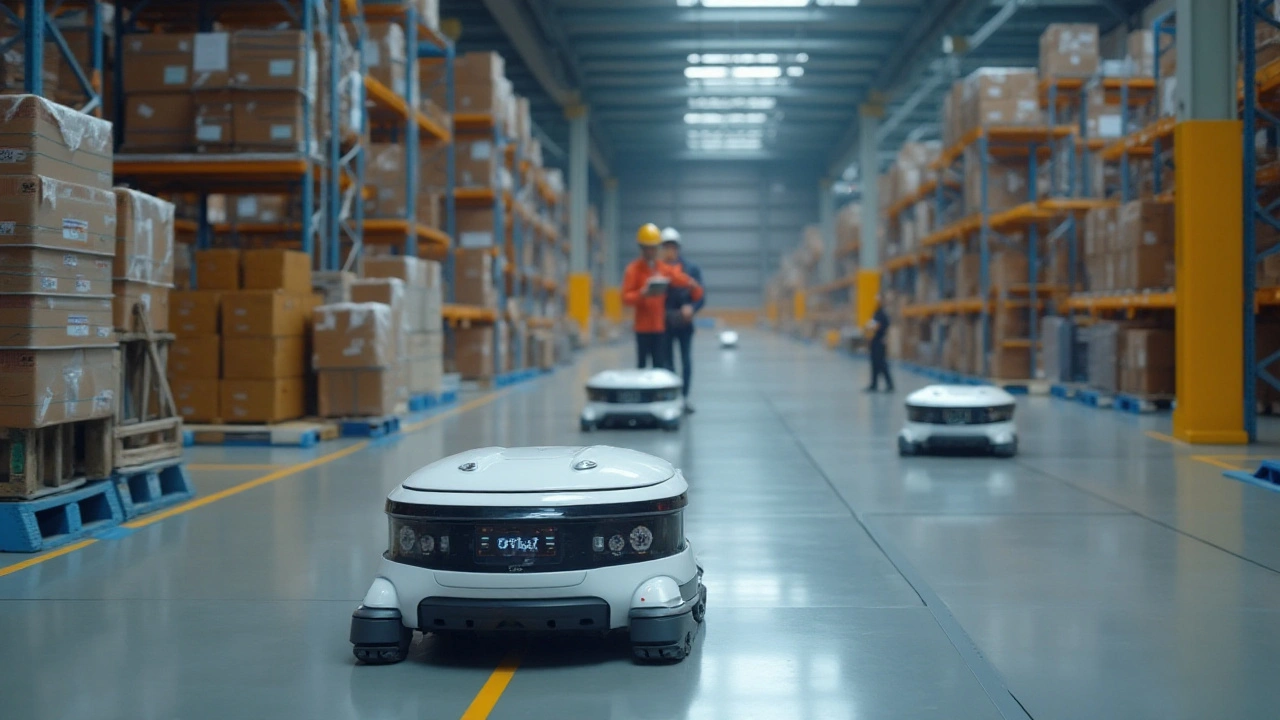The dawn of Artificial Intelligence has marked a transformative period for businesses worldwide. What was once the realm of science fiction has now become a daily operational reality, driving growth and innovation. Companies, large and small, are exploring the diverse applications of AI to optimize processes, improve customer experiences, and stay ahead in a competitive market.
In this age where technological advancements are fast-paced, understanding AI's role in modern business practices is essential. With AI tools becoming more accessible, businesses have the opportunity to harness unprecedented levels of efficiency and creativity.
- AI's Role in Modern Business
- Enhancing Efficiency and Productivity
- AI-Driven Customer Experience
- Future Trends and Considerations
AI's Role in Modern Business
The influence of Artificial Intelligence in today's commercial landscape is undeniable, creating ripples across industries. Businesses find AI indispensable for data analysis. This technology allows companies to identify patterns and glean insights that were previously impossible with manual processes. Machine learning algorithms enable real-time data processing, giving businesses a competitive edge. Innovation is at the heart of AI applications, as it opens up new business models and revenue streams. Today, AI crafts customer interactions, bringing personalization to unprecedented levels by predicting customer preferences and enhancing user experience. With automation, companies streamline operations, reduce errors, and cut costs significantly. In manufacturing, for example, AI systems not only enhance production efficiency but also foresee maintenance requirements, prolonging machinery lifespan and minimizing downtime.
Remarkably, the financial sector leverages AI to combat fraud and improve transparency. These intelligent systems can evaluate transactional data, spotting fraudulent patterns. AI-powered chatbots and virtual assistants in customer service handle inquiries, freeing up human resources for complex tasks, and ensuring prompt responses and satisfaction. An enlightening quote from Sundar Pichai, CEO of Google, encapsulates this perfectly:
"AI is one of the most important things humanity is working on. It is more profound than electricity or fire."This illustrates AI's revolutionary potential and deep-rooted impact across sectors. In healthcare, AI aids in diagnosis and personalizing treatment plans swiftly, offering a much-improved plan for patient care and management.
Delving into the retail landscape presents another lens through which AI's impact can be seen. Retailers predict demand, manage inventories, and optimize logistics through AI tools, which improves sales strategies. Enhancements in visual search technology allow customers to find products with ease by simply uploading an image, creating a seamless shopping experience. Online retail giants are capitalizing on AI to synchronize their supply chain operations as cutting-edge AI tools accurately predict shipping times and optimize routes, ensuring customer satisfaction and loyalty. Furthermore, AI algorithms help analyze consumer buying habits, offering insights into shifts in consumer behavior.
To understand this further, a detailed view of how AI plays a transformative role in modern business settings can be seen through a variety of sectors. Many industries have adopted AI to innovate, grow, and meet the demands of a tech-savvy customer base. The need for AI tools has never been more significant, with organizations eager to tap into its potential to realize higher returns on investment. Through AI-powered analytics, companies can track performance metrics, evaluate employee productivity, and design effective growth strategies. AI's capacity to handle and process vast volumes of unstructured data acts as a catalyst for organizational decisions, offering both short-term gains and long-term planning capabilities that were hard to imagine a few years ago.

Enhancing Efficiency and Productivity
In the fast-paced world of business today, Artificial Intelligence has emerged as a key tool for enhancing efficiency and productivity. Companies across various sectors are increasingly adopting AI technologies to streamline operations, reduce human error, and allow employees to focus on more valuable tasks. Automation of routine, time-consuming tasks is one of the primary areas where AI steps in. From data entry to scheduling, businesses are leveraging AI to ensure that these processes are carried out swiftly and accurately, resulting in significant time savings and improved productivity. Financial institutions, for instance, use AI to automate risk assessments and fraud detection, processes that used to consume significant manpower and hours.
Beyond automation, AI offers businesses the ability to analyze large volumes of data at speeds unmatched by human capabilities. This data analysis not only helps in making informed decisions but also in predicting future trends and consumer behavior patterns. By utilizing AI algorithms, companies can efficiently process customer feedback, identify product performance issues, and tailor their marketing strategies accordingly. A renowned AI application is IBM’s Watson, which has been employed by numerous companies for tasks ranging from developing personalized recommendation systems to conducting complex genomic research.
Integrating AI tools can lead to a cultural shift within organizations. As employees learn to collaborate with these technologies, productivity doesn't just increase in terms of number crunching or speed but in terms of creativity and innovation as well. With AI managing the mundane, employees have more bandwidth to engage in problem-solving and creativity, significantly contributing to business growth. A report from Accenture indicates that by 2035, AI could double the annual economic growth rates in developed economies, primarily through these very enhancements in productivity.
"AI is going to be a helper tool to elevate the work of humans; it's not a replacement but a complement," says John Doe, a leading AI research scientist. This sentiment is shared across the industry as businesses notice substantial gains not just in efficiency but in job satisfaction as well. Employees prefer to engage in more meaningful tasks without the distraction of repetitive tasks.
An integral benefit of AI is its capability to provide insights and predictions that would otherwise be difficult to obtain. Companies using AI-driven data analytics can deploy resources more effectively, understand bottlenecks, and make decisions that were previously based on a considerable degree of uncertainty. For instance, predictive analytics in supply chain management can foresee disruptions and optimize logistics in real time, ensuring minimal delays and improving efficiency.
The advantages of incorporating AI for business transformation have been demonstrated time and time again. Companies witnessing a successful AI adoption often point to an increase in productivity metrics and a decline in operational costs. In retail, AI has revolutionized inventory management; by predicting supply and demand trends with high accuracy, businesses can avoid understocking or overstocking, directly impacting profit margins.
While the future holds immense potential when it comes to AI, it is crucial for businesses to carefully plan their AI integration strategy. Selective application, regular assessment, and refinement are keys to truly harnessing the capability of AI technologies for productivity. Companies that manage this balance well will continue to benefit in measurable ways, paving the way for innovation and sustained growth. As AI continues to evolve, its role as an indispensable productivity tool is certain to expand, creating new opportunities across various business landscapes.

AI-Driven Customer Experience
Today's businesses understand that a strong focus on customer experience is crucial for sustained success and growth. With the advent of Artificial Intelligence, companies have an array of tools at their disposal to elevate customer interactions to unprecedented levels. AI algorithms, for instance, are routinely analyzing vast amounts of customer data to glean insights into consumer preferences, enabling businesses to tailor their offerings to better meet client needs. This technology lends itself to personalization, ensuring users feel valued and understood—qualities essential for cultivating brand loyalty.
Consider the use of AI chatbots, which are now widely implemented to provide real-time assistance and support. These bots offer round-the-clock service, solving customer queries swiftly and efficiently. What's remarkable is their ability to learn and evolve from each interaction. As these AI systems gather more data, they become adept at predicting customer needs, sometimes even before customers articulate them. Such predictive capabilities are pivotal in maintaining a proactive, rather than reactive, customer service approach.
Personalized recommendations are another facet of AI in this realm. Imagine visiting an online store that not only remembers your past purchases but also suggests products based on your browsing habits and purchase history. Companies like Amazon and Netflix have effectively used AI to refine their recommendation engines, leading users to discover new products and shows they'd likely appreciate. This kind of tailor-made service boosts engagement levels, as customers develop a deeper connection with the brand.
"The essence of AI is its ability to sit next to us in our daily lives, pick up on what's going on around us, and provide us with the most relevant recommendations," states Joe McKendrick, a tech industry analyst.
AI's application in customer experience also extends to sentiment analysis. By evaluating customer feedback across multiple platforms, AI tools can discern not just what customers think, but how they feel. This nuanced understanding drives informed decision-making, allowing businesses to tweak their strategies and offerings in alignment with customer expectations. Negative feedback isn't merely addressed; it becomes a stepping stone toward long-term improvements.
In terms of securing customer loyalty, AI-powered loyalty programs are garnering interest. Unlike traditional schemes that offer generic rewards based on points, these programs analyze spending behavior and preferences to offer personalized incentives. With innovation at their core, such programs have been shown to enhance customer retention, as clients feel their specific needs are recognized and rewarded by the business.
The AI evolution is undoubtedly propelling businesses forward, but with this power comes the responsibility to use it ethically. Respecting customer privacy and ensuring data security are vital, as any breach could undermine the trust so carefully built. Companies must focus on transparency, ethical data usage policies, and prioritize the security of customer information to continue fostering positive experiences in an AI-driven world.

Future Trends and Considerations
As we look towards the future, Artificial Intelligence is poised to become an even more integral part of business operations, adapting to various needs and challenges. Companies are increasingly adopting AI not just for operational tasks but as a strategic tool for decision-making and innovation. Emerging trends indicate that AI will soon be capable of more complex reasoning and autonomy, leading to smarter, more efficient systems that can anticipate needs and proactively address potential issues. Such advances are not just limited to improving internal processes but extend to enhancing customer interactions through predictive analytics and personalized experiences.
One of the most exciting aspects of AI technology is its ability to continuously learn and improve. This has sparked significant interest in developing autonomous products and services capable of learning from their environments and user interactions to deliver improved outcomes over time. As businesses look to harness this technology, they'll need to consider the ethical implications of AI, ensuring that its deployment is fair, transparent, and unbiased. It's worth noting that regulatory frameworks are still evolving to address these concerns, and companies will need to stay updated to maintain compliance and customer trust.
Moreover, investments in AI research are projected to rise significantly, as organizations vie to gain a competitive edge. According to a report by leading consultancy firm McKinsey & Company, businesses could experience an uplift of nearly 30% in profitability by successfully employing AI strategies. As an industry insider insightfully said,
"Harnessing AI's full potential requires a clear strategic vision and a commitment to fostering a culture of innovation."This quote encapsulates the mindset companies must adopt to effectively integrate AI into their operations.
As AI continues to evolve, an interdisciplinary approach will be crucial, blending aspects of technology, psychology, and business management to create systems that not only perform tasks but also understand the nuances of human interaction. Companies will need to prioritize training and upskilling employees to work alongside AI systems effectively. Additionally, with AI's expanding role, cybersecurity measures will need to advance in tandem to protect against emerging threats. In essence, staying ahead in the AI race will demand agility, forward-thinking strategies, and an unwavering dedication to ethical practices.

